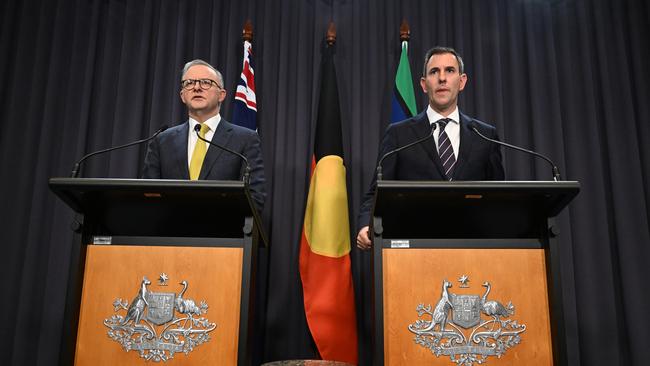Spending cuts alone won’t pay off debt
While most Australians are looking at economic uncertainties with only themselves in mind, we can’t ignore the impact rising inflation and interest rates will have on government costs.

This is occurring in an era of low wages growth, despite the tight employment market. The current 3.5 per cent unemployment rate is extraordinary, but it masks underemployment in the economy.
While economists are saying a recession is a genuine risk if the Reserve Bank doesn’t get its interest rate adjustments right this year and next, it remains more likely that we keep growing and avoid such a scenario. This is important because most people can make lifestyle adjustments to manage higher interest rates and the impact that has on cost of living.
Panic often can be self-inducing, which is the point National Australia Bank chief executive Ross McEwan made at The Australian Strategic Business Forum this week. But a recession would mean rising unemployment, which changes the scenario.
When Australians lose their jobs, that’s when it is time to panic. No job means limited income streams, and unfortunately we aren’t a nation of savers beyond compulsory superannuation. When people can’t pay their mortgage, that’s when they could be forced to sell in a declining market. Economic contagion can follow.
While most Australians are looking at current economic uncertainties through the above prism, we also can’t ignore the impact rising inflation and interest rates will have on government debt. This factor will affect all our lives in the coming decades.
Borrowing costs for government are rising when national debt is creeping towards $1 trillion. And if we lose our AAA credit rating that will only add to the future interest bills. The lower your credit rating, the higher your interest payments.
The new Labor government has promised not to raise taxes other than for multinationals to address tax avoidance. That means, unless it constrains spending, debt will keep on growing. If the economy does slow, debt will rise even faster because a slowing economy delivers less revenue.
It really should be compulsory for anyone who wants to hold a finance portfolio to study economics. Only the pluralist in me prevents me firming on that view.
All of which is why the government should have announced a tax summit instead of a skills summit. But tax reform is hard and I doubt the new government has the stomach for it. Which is a shame because we know the window for significant reforms is small in Australian politics. Go hard early or risk becoming a do-nothing administration. Just ask Kevin Rudd. At least he apologised to Indigenous Australians.
Perhaps the most negligent inaction by the previous government was failing to lengthen the maturity structure of national debt. Most debt is accrued via the issuing of short-terms bonds, but during the era of record low interest rates it was daft not to lock in low long-term interest rates on 10, 20 or 30-year bonds. In addition, nearly 5 per cent of government debt is pegged to the consumer price index, which means it goes up when inflation goes up, adding to the debt burden on the budget.
Had the Coalition done so it would have insulated the nation from rising rates in the current inflationary climate. Which would have kept interest payments in check in the coming years, thus lowering the multibillion-dollar annual interest rate load – money that could have been spent on service provision instead.

As treasurer, Josh Frydenberg had the power to instruct the Treasury to look for cheap long-term bonds instead of the quick and easy short-term bonds that will regularly need to be replaced by much higher interest rate bonds. These were decisions made by the Australian Office of Financial Management – which answers to the head of Treasury, Steven Kennedy, who in turn used to answer to Frydenberg. Jim Chalmers is now his master.
No doubt their excuse for this failure would be that the market wasn’t liquid enough, but that’s bollocks. Australia is a safe financial destination and during the pandemic our health achievements, coupled with our AAA credit rating and strong financial position relative to the rest of the developed world, made us a safe haven for anyone looking to park some money.
Excuses also can’t be made by simply claiming that criticism is easy in hindsight but wasn’t reasonable in real time. In a scholarly article published back in 2020, in The Australian Economic Review, economists Chris Edmond, Richard Holden and Bruce Preston implored government to lengthen the maturity structure of its debt. Referring to a scenario whereby the run of record low interest rates comes to an end, this triumvirate of economists argued that “prudent fiscal policy should hedge against such a risk by lengthening the maturity structure of government debt. We should issue more long-term government debt … to lock in low interest rates for years to come. We should not assume we will always be able to roll over short-term debt at current rates.”
Read that again and reflect on the cost of the previous government’s incompetence on this score. On the budget. Indeed the incompetence of Treasury, unless it recommended doing so and the Coalition refused. If so, it’s time to release the correspondence.
The coming years will see citizens expect more of their government, not less. The social-liberal tendencies of modern Australia are such that we want an expansion of government services to provide for the needs of an ageing population alongside the desire to improve services for all, including the disabled, in childcare as well as in aged-cared facilities. Improved dental care is surely next. It won’t stop there.
Such offerings by government are expensive, yet both major parties are locked into a myopic debate about constraining spending and refusing to put up taxes for fear of a voter backlash. So how do we pay for the needs of our democratic polity? So far, more debt has been the answer – but the new inflationary environment has profoundly changed that response. It isn’t sustainable. Which is why tax reform must be on the government’s agenda in its first term, not sometime thereafter.
Peter van Onselen is a professor of politics and public policy at the University of Western Australia and Griffith University.








It is tempting to catastrophise the state of the economy right now. High inflation levels and rising interest rates will put significant strains on anyone with a home or investment loan. Property prices are expected to tumble, perhaps by as much as 25-30 per cent.